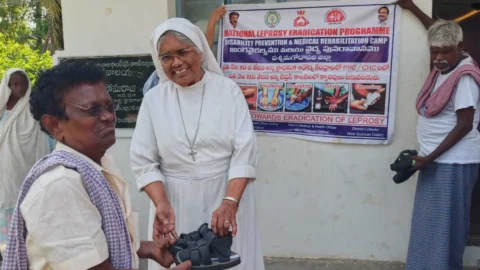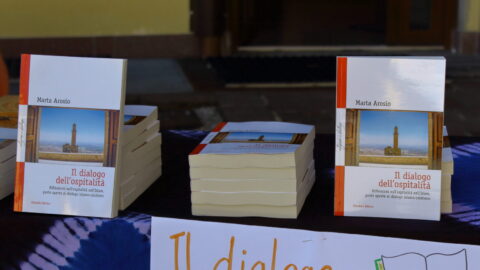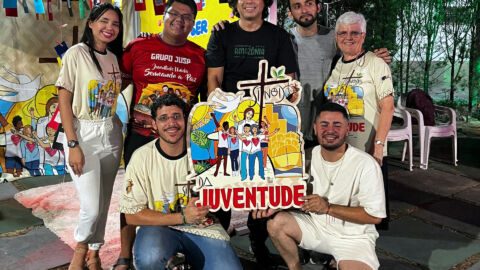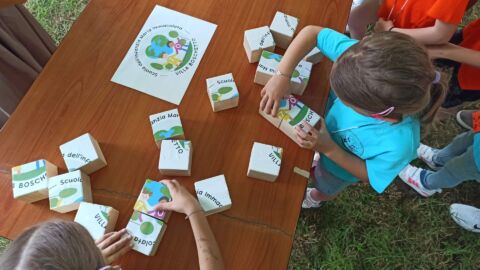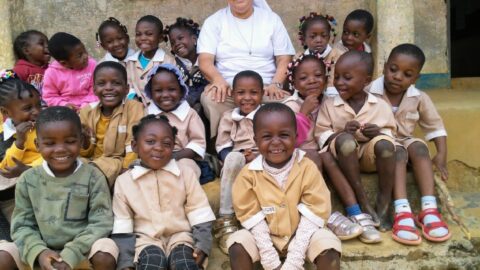In the sixth and last chapter of Laudato si, entitled Ecological Education and Spirituality, we discover that the “ecological conversion”, to be true, implies a “spiritual conversion” (cf. LS 202-221) that leads to a new awareness of the relationship of human being with himself, with the other, with society, with creation and with God.
Pope Francis on March 27, 2020 in St. Peter’s Square invited us «to grasp this time of trial as a time of choice. It is not the time of Your judgment [Lord], but of our judgment: the time to choose what matters and what passes, to separate what is necessary from what is not. It is the time to reset the course of life towards you, Lord, and towards others ».
Numbers 233-237 of the encyclical speak of sacramental signs and celebratory rest and seem to me to give excellent ideas for a spiritual conversion and thus reorient our life towards God and towards our neighbor.
“The universe unfolds in God, who fills it completely. Hence, there is a mystical meaning to be found in a leaf, in a mountain trail, in a dewdrop, in poor person’s face. The ideal is not only to pass from the exterior to the interior to discover the action of God in the soul, but also to discover God in all things”. (LS 233)
Here is one of the suggestions of Pope: contemplate the mystery of God in the nature that surrounds you.
One of the positive aspects that this time of pandemic is giving me is precisely having an extended time to look around, to learn about the features, the colors, of this piece of Calabrian land where I live now. Here, in Rossano, our community lives in a former Franciscan convent surrounded by olive and citrus groves. From our windows, we can see the Ionian Sea in the distance with its green, blue, deep blue colors and, when the sky is clear, we even see the coasts of Puglia.

Our missionary animation activities, like all pastoral activities, have been considerably reduced due to Covid. Everything or almost everything happens online, so you risk spending many hours in front of your computer screen.
How beautiful is the walk after lunch! If I go to Piano Russo, a district high up on the hill, I can contemplate Rossano town perched on another red clay hill, from which it takes its name. If, on the other hand, I take the road that goes down, I can reach the bridge over the Colagnati stream, passing close to diving walls carved by the wind and rain. On the other side of the road, after green balcony of olive trees and prickly pears, the Colagnati valley opens up with expanses of citrus groves all sorted and well cultivated. Finally, if I wish to make a pilgrimage, I can climb the hill that stands in front of the convent, on top of which stands a Cross placed at the beginning of the last century by the Passionist fathers during the popular missions. From above you can contemplate a beautiful landscape, because from the air, you can touch the sea and, with a leap from the hills, you are immediately on the Sila Mountains. As I walk, I pray the rosary and rejoice, contemplating the beauty of nature. How great are you Lord, God and Creator of the Universe!
I feel in tune with the words of St. John of the Cross «Mountains have heights and they are plentiful, vast, beautiful, graceful, bright and fragrant. These mountains are what my Beloved is to me. Lonely valleys are quiet, pleasant, cool, shady and flowing with fresh water; in the variety of their groves and in the sweet song of the birds, they afford abundant recreation and delight to the senses and in their solitude and silence, they refresh us and give rest. These valleys are what my Beloved is to me ». (LS 234)

How can we not admire the Beauty of God the Creator in all this, recognize his great wisdom, his creativity? How can I not feel small in front of so much greatness? Small, yes, but part of a great, immense and beautiful work of art: Creation.
How can I keep beautiful all this?
After a few walks, it came naturally to me, before leaving the house, to take two bags and gardening gloves and start my ecological rosary … Yes in the midst of so much beauty, there are also some stains … of dirt (glass and plastic bottles, cans, paper and, now even masks!). So, while I return to the convent, I collect (with gloves!) what I find, trying to differentiate it in the two bags. Near to home, here are the garbage cans … A small and simple activity in which, both in spring and in summer, I would like to involve other local people. To raise awareness on the care and exactly the care of the common home, as Pope Francis invites us: «We are called to be instruments of God our Father, so that our planet might be what he desired when he created it and correspond with his plan for peace, beauty and fullness » (LS 53).

Even in the convent, we worked hard to make the garden more beautiful. Sr. Antonia has a particular flair for planting flowers and plants, to take care of them, prune them and free them from weeds. What a satisfaction to be able to pick genuine fruits: oranges, lemons, figs, clementines, grapefruits, pomegranates, persimmons… . I help to eliminate weeds, dry branches, leaves, I am learning to compost, with the separate waste collection … in short, there is who plants and who irrigates, but, writes St. Paul: “Neither those who plant nor those who irrigate are worth anything, but only God, who makes it grow”. (1 Cor 3: 7) “We are indeed God’s collaborators” and it is nice to recognize his presence around us, in our daily life.
«Living our vocation to be protectors of God’s handiwork is essential to a life of virtue; it is not an optional or a secondary aspect of our Christian experience » (LS 217)
In nn. 235-237, the Pope writes: “The Sacraments are a privileged way in which nature is taken up by God to become a means of mediating supernatural life. Through our worship of God, we are invited to embrace the world on a different plane.” (LS 235)
“It is in the Eucharist that all that has been created finds its greatest exaltation… In the Eucharist, fullness is already achieved; it is the living centre of the universe, the overflowing core of love and of inexhaustible life. Joined to the incarnate Son, present in the Eucharist, the whole cosmos gives thanks to God. Indeed the Eucharist is itself an act of cosmic love: “Yes, cosmic! Because even when it is celebrated on the humble altar of a country church, the Eucharist is always in some way celebrated on the altar of the world”. The Eucharist joins heaven and earth; it embraces and penetrates all creation. The world which came forth from God’s hands returns to him in blessed and undivided adoration” (LS 236)
“On Sunday, our participation in the Eucharist has special importance. Sunday, like the Jewish Sabbath, is meant to be a day, which heals our relationships with God, with ourselves, with others and with the world. Sunday is the day of the Resurrection, the “first day” of the new creation, whose first fruits are the Lord’s risen humanity, the pledge of the final transfiguration of all created reality.” (LS 237) A little further, “The law of weekly rest forbade work on the seventh day, “so that your ox and your donkey may have rest, and the son of your maidservant, and the stranger, may be refreshed” (Ex 23:12). Rest opens our eyes to the larger picture and gives us renewed sensitivity to the rights of others. And so the day of rest, centred on the Eucharist, sheds it light on the whole week, and motivates us to greater concern for nature and the poor.”
Clear words that challenge us: “How is my relationship with the Eucharist? Is Sunday really the day of rest, in which my relationships with God, with myself, with my neighbor and with creation heal? It is time to reset our life’s course towards the Lord, together with all the brothers and with sister mother Earth… Have a pleasant journey!
Sr. Agnese Roveda, Province of Italy

